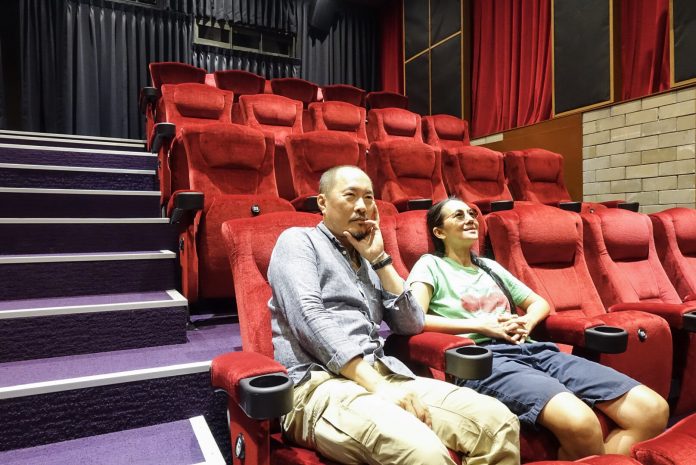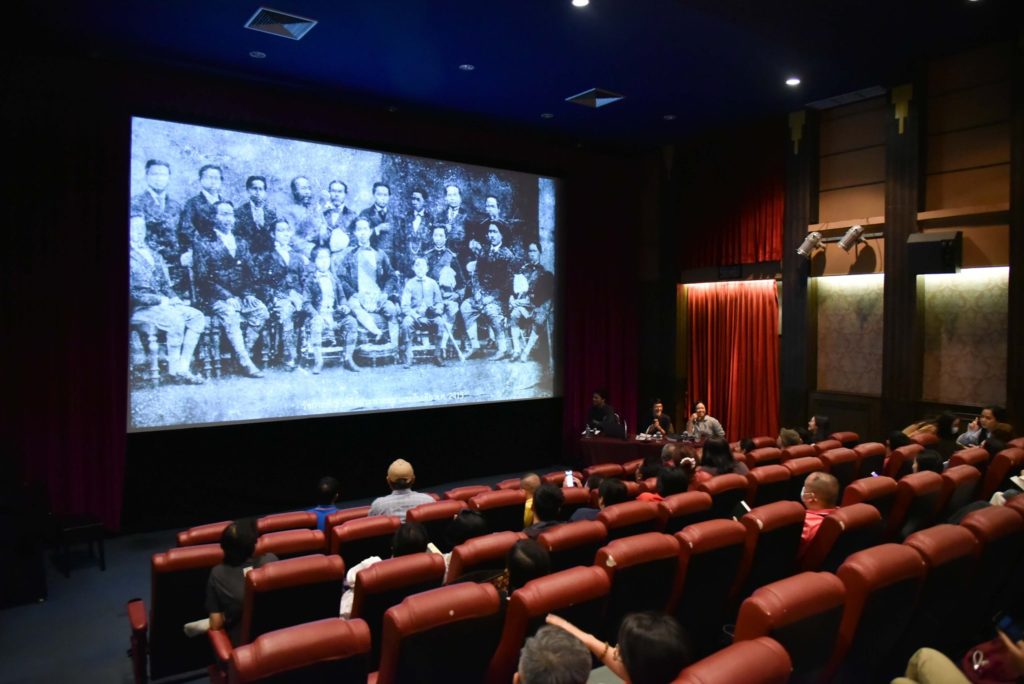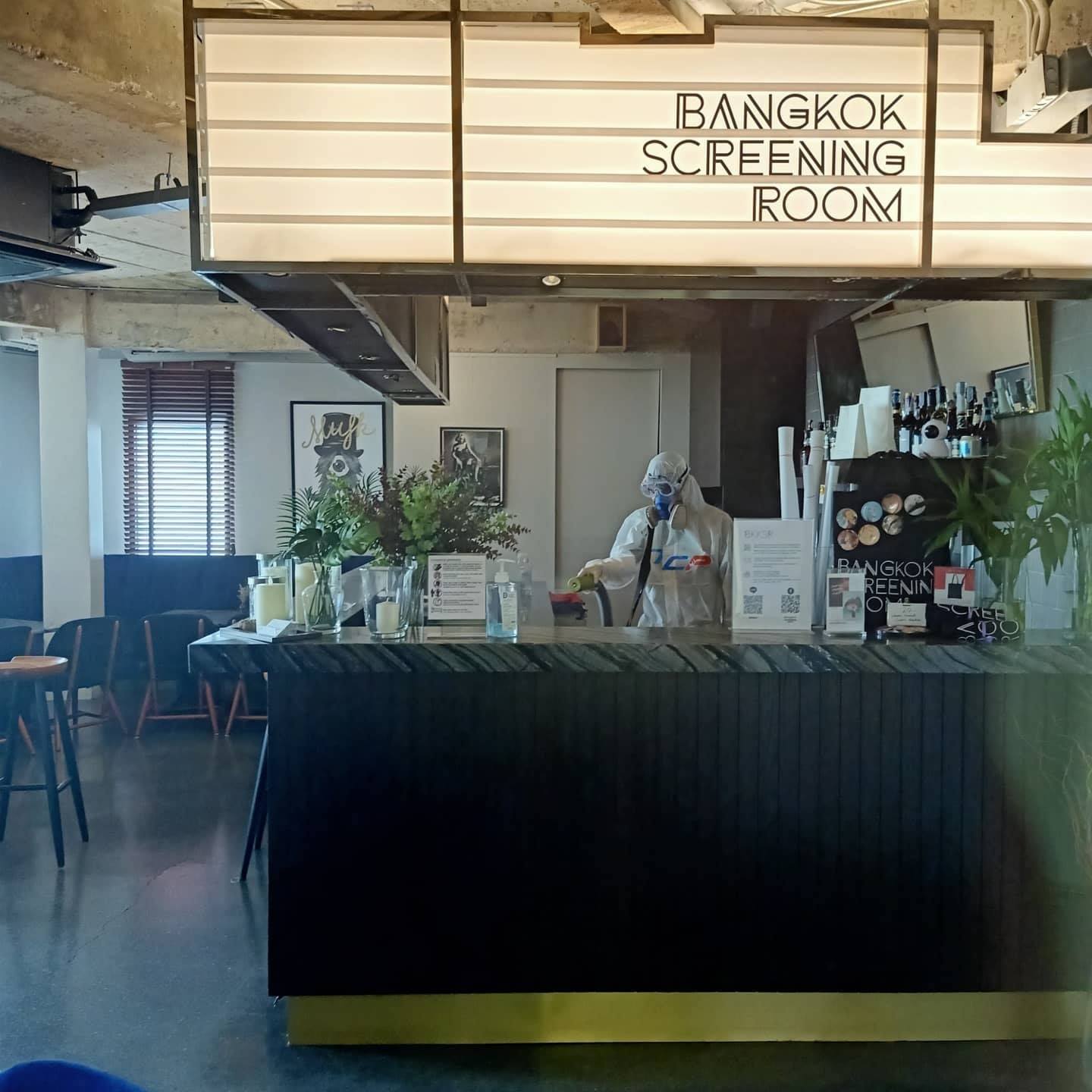Thailand’s cinemas are reopening. But are audiences ready?
by Chayanit ItthipongmaeteeTop: A health worker sprays disinfectant inside a cinema of MVP chain.
Whether major chains perched atop shopping malls, vintage standalone survivors or indie arthouses persisting on passion; one drama is playing in all of Thailand’s theaters: uncertainty.
Despite being given the green light Friday to reopen after going dark over two months to stem the spread of COVID-19, cinema operators large and small say there is a long way to go before cinemagoers can expect anything like what they were used to – if and when they come back.
“We still won’t reopen any time soon,” Manit Sriwanichpoom, co-owner of Cinema Oasis, said Friday after hearing the news. His single-screen, downtown arthouse on Soi Sukhumvit 43 just opened in 2018.
Manit said he’s been closely following developments in other countries. He said some that have reopened, such as in Vietnam, remain empty due to fear of the virus.
“It’s not worth it to reopen right now. Even if we reopen, it’s not worth the cost,” Manit said. “I’ve talked to a public health official, and they said the second wave is definitely coming. We just don’t know when.”

While Manit insists on keeping his cinema shut, it’s something he may have the luxury of doing as a successful artist who owns other properties. Across town, another cinema operator was thrilled to learn she could soon reopen. Still, she doesn’t expect it to suddenly spring back to pre-COVID activity.
“It’s good news, but I’m not sure if people are confident to come back yet,” said Sarinya Manamuti, co-owner of the Bangkok Screening Room.
Sarinya opened the Bangkok Screening Room three years ago in the Sala Daeng area. Offering comfortable seats – 52 of them – the small alternative cinema is eligible to reopen Monday, Sarinya said they will wait until at least June 9 to prepare the necessary COVID-19 measures.

She was anticipating their necessity even before the pandemic response team announced today’s unexpected news.
“We will have to comply with the government recommendations to reopen such as limiting capacity, safe distancing, temperature checks, et cetera,” Sarinya said in an interview conducted prior to Friday’s announcement. She also said patrons would have to scan a QR code to check in and out using Thai Chana (Thailand Wins), the controversial government tracking system.
They’ll also need more details. Today’s announcement that the next phase of reopenings would include cinemas and theaters did not come with specifics beyond capping audiences at 200, who must practice social-distancing.
“Being a small-scaled arthouse cinema that’s not inside a big shopping mall should help us maintain the restrictions more effectively,” she said.
Film critic Kong Rithdee said it will take time for movie-goers to be comfortable visiting the venues.
Kong, deputy director of the Thai Film Archive, said cinemas and football stadiums will be the canaries in the COVID mine, showing whether society can really return to normal yet.
“It’s when someone coughs inside the cinema and we’re not panicked, that’s the day we truly win COVID,” Kong said.
His archive’s cinema in the western outskirts announced that it will reopen June 16.

Curtain Fall
On Jan. 8, Thailand became the first country outside of China to detect someone infected with the then-mysterious viral malady. The public learned the following week, and, by mid-March, new daily cases had climbed to over 100. Theater curtains everywhere soon came down for a final time after all entertainment venues, including cinemas, were ordered shut.
Sensing their obligation to public health, some didn’t wait for that order and had already ceased operations earlier on. That included Manit’s Cinema Oasis.
“We decided to close ours on March 15. At the time there was already a sign that we needed to close the venue,” Manit said.
Some prevention and social-distancing practices were initiated at his cinema – such as arranging the seats to leave distance and disinfecting the area – but eventually he said it’s no point in keeping the doors open.
“It’s not worth it. This is people’s lives we’re talking about,” said Manit, who is also known as a photographer and producer of Shakespeare Must Die, a film famously banned by censors.

Far from Bangkok’s arthouse purveyors, the same struggles were echoed by the theater chain which dominates parts of the northeastern region.
With box office revenue already fallen to almost half of what was expected in January and February, the MVP chain was forced to shut its 15 screens in four Isaan provinces. It operates five in Buriram, four in Si Saket, three in Kalasin and three in Loei.
It shifted some employees to its offices and told others to work from home, but was unable to pay others.
“It’s very tough on us too. Since we had to shut all of our venues, we have had zero income,” said Komkrit Pipatpanukul, MVP’s second-generation owner.

He said the virus hit just at the worst time possible.
“The second quarter is the prime time Hollywood movies are released and shown at our cinemas,” Komkrit said. “We rely on Hollywood movies for up to 70-80% [of our business.]”
Some of the year’s biggest blockbusters that would have moved ticket sales, from live-action Mulan to Black Widow and the latest Bond film, were bumped from release schedules by the pandemic.
Reached Friday for the reaction to the news they could soon reopen, MVP said it was still discussing plans.
Representatives of the two chains owning most of the nation’s theaters – Major Cineplex and SF Cinema – did not return calls seeking comment.
Major Cineplex, the largest chain with nearly 500 screens, reported revenues were down 45% in the first quarter compared to last year. Its shares traded up slightly late this afternoon on word of the reopening. SF Group, the second largest player, operates nearly 400 screens and is privately held.
The two chains also operate bowling alleys and karaoke centers that were ordered closed. Both announced Friday that they would resume business Monday. Beloved downtown movie palace Scala has yet to announce plans.

The Art of Getting By
With no tickets to sell, popcorn to hawk or sticky floors to clean, theaters and their employees have been left in the lurch as their patrons shelter – and stream – in place at home. Some tried to continue reaching them; others could not.
Cinema Oasis opted to offer six streaming movies online – all made and produced by Manit and his wife, Ing Kanjanavanit.
Did viewers respond?
“Not really,” said Manit, admitting that his movies, mostly hours-long documentaries with political overtones, are not exactly “easy to watch.”

Bangkok Screening Room in early April launched a so-called Movie Pack of ticket presales discounted by 40% for use when the projectors can run again. The passes – THB900 for five movies and THB1,800 for 10 movies – were good for use up to a year after reopening.
Unlike other cinemas and distributors, Sarinya said they couldn’t afford the expensive licenses to stream online.
“As an exhibitor of a small arthouse cinema, we can’t afford to buy films or acquire the rights to Video on Demand, so it’s quite challenging when some new films that we’ve planned to screen were already available online,” Sarinya said. “A lot of people still don’t really understand that a film license can be costly, and there’s always a middleman to everything.”

Streaming, then?
It remains to be seen if COVID-19 proves the final nail in the industry’s coffin.
Stuck at home, people have turned to social media and streaming services more than ever.
While its Thailand numbers are not available, U.S. streaming giant Netflix in April reported a big surge of over US$709 million in global profits on revenue of US$5.7 billion in the first three months of the year – a 27% year-on-year increase for the quarter. The number of paid subscriptions, globally, grew by nearly a quarter to 182 million.
One group of cinephiles whose passion project is bringing non-mainstream films to the capital, the Documentary Club, was quick to shift its efforts online.
Instead of showing films at partnering theaters such as Lido, Bangkok Screening Room, House Samyan and even megachain SF as it has for the past six years, Documentary Club announced March 15, before the ban, that it was launching an online platform for its films to reach those sheltering at home.
Dubbed Doc Club on Demand, it brought dozens of licensed movies to video-sharing site Vimeo. Each costs US$1.99 and can be watched as often as liked, until its license expires.

“Online is a space I’ve been trying to work on for a year now, but making it really happen is difficult. I’d say the COVID-19 was a big push,” said Documentary Club founder Thida Plitpolkarnpim, former editor of now-defunct film magazine Bioscope.
Thida said her move to streaming will most likely be permanent, whether the pandemic ends or not.
“It used to be an alternative, but now it’s gone beyond that. Now it’s the main channel for us,” Thida said.

Though cinemas can soon reopen, Thida said that they will face new challenges, as audiences will be even more selective about leaving home to pay for the big-screen experience.
“Even though we want to go back to cinema, it’s not like we will give every movie a chance, like before,” she said.
With several film credits of his own, Manit said that the future of filmmaking will change as well, with more avenues for small-scale productions that don’t need heavy investment in the process.
That’s likely true, given the crash of Hollywood productions. Rather than packing actors and crew onto sets, animation has been booming as work such as voice acting and drawing can all be done remotely.
“We won’t see anything going the way it used to for awhile,” Manit said.
Coconuts has journalists on the ground in eight cities working hard to publish true stories that matter. You can support our work by becoming a COCO+ Member or making a Patron payment.